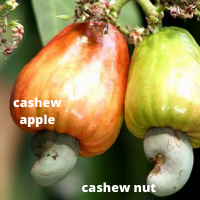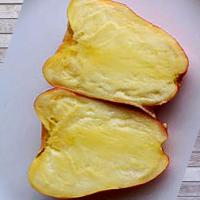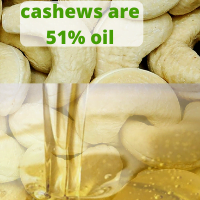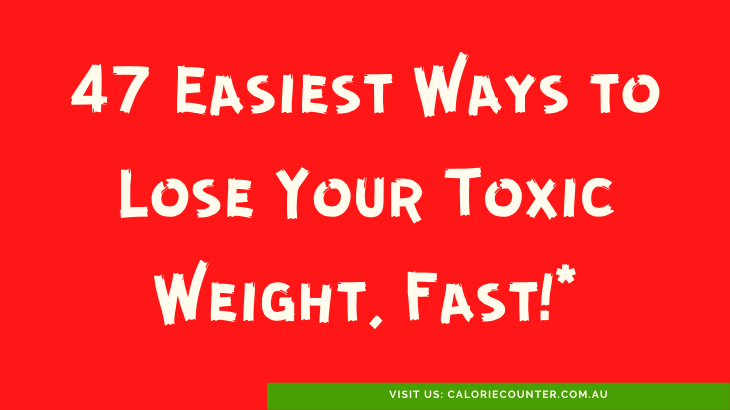Are cashew nuts good for you, or are they bad for you? They are growing in popularity, so let’s take a closer look at cashew nuts nutrition, calories, health benefits and disadvantages. Are there any general reasons to choose cashews over, say, almonds? Why don’t nutritionists go “nuts” over cashews?
Cashew apples look different

Cashew nuts are the seeds of the tropical cashew apple tree, native to South America. The apples, unlike the apples most of us are familiar with, do not have cores with seeds in them. Instead, the seed (cashew, or cashew nut) grows in a tough shell attached to the bottom of the apple! Although flavoursome, The apples don’t usually make it out of their local markets because they bruise and spoil quickly.

Cashew nuts, on the other hand are exported far and wide. Australia has its own small cashew industry, but most of the cashews in our supermarkets are imported from South America, South East Asia, and Africa.
How Cashew Nuts are Processed
The cashew seed has a double-layered shell which is extremely hard to open. A nasty mix of several different plant acids lies squeezed between the shell layers, ready to squirt on anyone who unwittingly gives it a crack. This acidic liquid is the same chemical found in poison ivy, so getting the cashew shell juice on your skin is painful and damaging.
The processors first boil and dry the seeds before carefully cracking them open with a hand-operated nutcracker.
Skinned and Roasted
Workers use their hands to gently pluck just the kernel of the seed from the meticulously cracked shell to reveal the cashew nut we are familiar with. Thereafter, the nut is usually skinned, roasted, and salted before making its way into a package ready for the supermarket. It is possible to buy unskinned and unsalted cashews, but these are much less tasty and therefore unpopular.
When the product is boiled or steamed most of the caustic juice runs off. Even so, acid burns and chronic skin irritations are a common occupational hazard for the workers who process cashews. There has been growing activism by consumers and the Fair-Trade movement to protect vulnerable workers from exploitative cashew producers.
The next time you see a recipe calling for “raw cashews”, allow yourself a chuckle.
Cashew Nut Calories (are they fattening?)
Cashew Nuts are high in calories. The popular roasted, salted kind weighs in at an eye-watering 616 calories per 100g! For comparison, something like a bacon burger with cheese has 177 calories per 100g.
The reason for the high calorie count is fat (oil): cashews are half fat, half everything else (carbohydrates, protein, fibre, minerals, vitamins, etc.). This is not surprising because most nuts have a similarly high fat to weight ratio, for example macadamia nuts have 724 calories per 100g and are 75% fat.
Cashew Nut Nutrition benefits
Like many of the popular nuts, cashews are high in minerals like zinc, magnesium, and selenium. Magnesium is especially important for body weight control because it is used when the body regulates metabolism and fat deposits. They are also a good source of plant protein, coming in at 17g per 100g. Cashews contain vitamins in abundance, especially vitamin E. Plant fibre holds everything together in a honeycomb nut structure, which helps with good digestion.
Almost as good as carrots?
No outline of cashew nuts nutrition would be complete without noting that cashews have excellent stores of carotenoids like lutein and zeaxanthin. Carotenoids are a class of organic pigment which give carrots and other orange/yellow vegetables their colour. These wonder chemicals are believed to prevent some cancers and promote eye health as we age.
Cashew Nuts Disadvantages
Unfortunately, it cannot be said that cashew nuts stand out from other nuts in terms of micronutrients. They are not particularly healthy when compared to almonds, pecans, walnuts, or pistachios, so there is no reason to choose cashews other than the flavour. Studies like this one show that most other nuts outperform cashews from a nutrition perspective.

Super high fat content
The main disadvantage of cashews is the high calorie count, which can punish unsuspecting dieters. Chicken and cashew stir-fry is a popular dish with a deceptively high calorie count, thanks to the cashews. If you are sharing a plate of cashew chicken with someone, we suggest that you focus on the chicken, and let the other person eat the cashews! Remember that cashews like many nuts are very “moreish”, so it is easy to keep eating well after you hit the calorie target.
You will hear people say that the oil/fat in nuts is the good kind, they are right, but it is still oil.
If you eat too many cashew nuts, you will gain weight quickly.
Gassy Nut
Some people are prone to experiencing bloating and gassiness after eating cashews. This is because of the triple-whammy of high fat, high fibre and high tannin content. They just take a long time to be digested, all whilst releasing their tannins. Tannins are antinutrients, you can read about what we think of antinutrients here.
Kidney shaped, kidney beware
Try to avoid cashews if you have kidney stones or a propensity to produce them. This is because cashews have a high mineral (especially phosphorous), and oxalates content. An alternative renal-friendly nut would be macadamias because they have a much lower phosphorous content.
Allergies alert
Whilst the obvious disadvantage of tree nuts like cashews to people with nut allergies need not be mentioned in this article, it is worth pointing out that cashews contain a rather special allergen called anacardic acid (this is a key reason they are cooked during processing). Anacardic acid, also known as urushiol, in even tiny amounts can cause anaphylactic shock in sensitive people.
Storing Cashews

The next time you see cashews in the supermarket, look closer. You might notice that the plastic package feels a bit different to regular bags, and you will often find a little “oxygen absorber” sachet nestled inside. This is because oily nuts like cashews have a chemistry with common plastics: they tend to, kind of, dissolve into each other. Without going too deep into the chemistry, lipid oxidation is a common problem with stored nuts, which combined with free monomers in plastic packaging, can result in unwanted combination reactions.
Storage harms cashew nuts
Unlike many other nuts, cashews are sold skinless and they contain relatively high amounts of plant acids. Without their protective skin, they are exposed directly to packaging plastic and oxygen, so it is no wonder that reactivity is an issue. Storage conditions affect cashew nuts nutrition more than nuts with shells and/or skins.
If you store cashews in a low-grade plastic container for a few weeks or months, you may find that the cashews taste like plastic! (Don’t eat them if they do).
Cashew Nuts Nutrition Conclusion
Nuts in general are nutritious and should be a moderate part of every balanced diet, however, our inescapable conclusion is that you can do better than cashew nuts!
When we compare cashew nuts nutrition to other nuts, we see that they are mediocre to sub-par. They are just as fattening yet less nutritious than alternatives like almonds. Their physical form makes them prone to over-processing and spoilage. Many of the cashew nuts for sale in our stores are harvested and processed in India and Vietnam in ethically questionable conditions.









